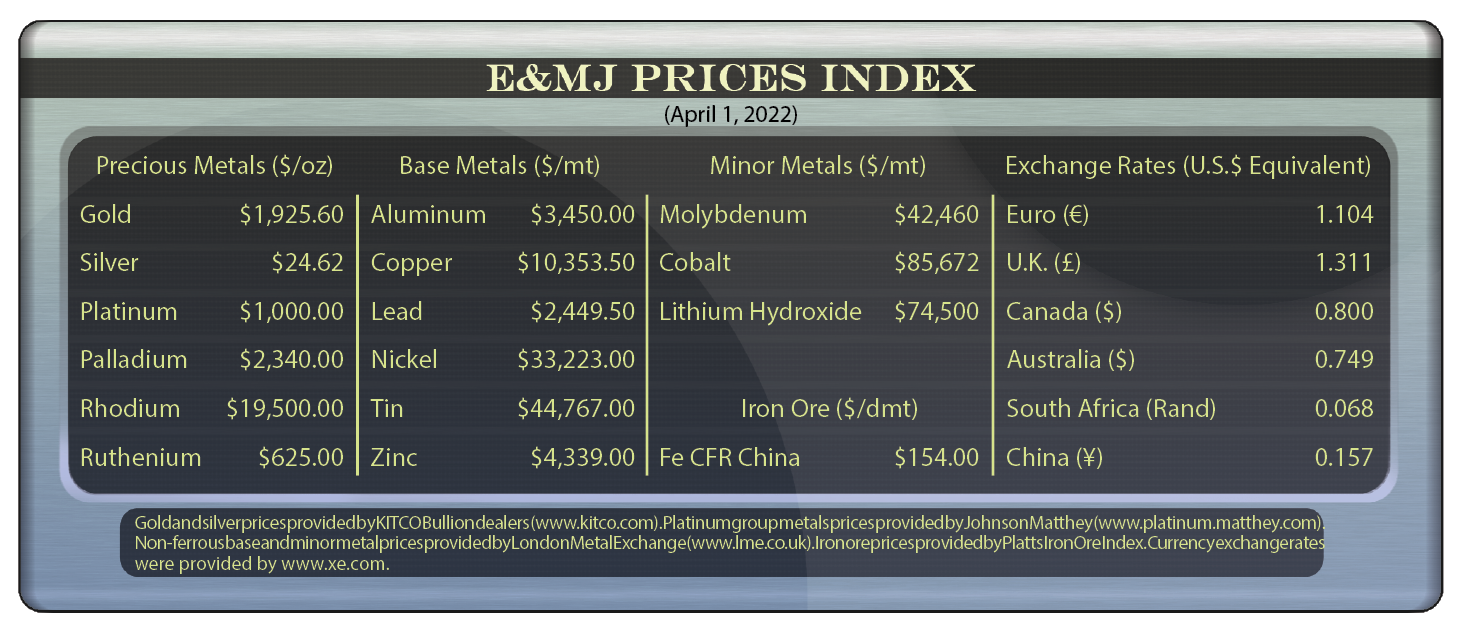The war in Ukraine continues to impact metal markets. Nickel trading has settled somewhat following last month’s breakdown in nickel trading at the London Metal Exchange (LME). Regulators in the U.K. have launched a review to determine what went wrong. They plan to examine the way the LME suspended nickel trades on March 8. The Bank of England also announced
it is looking into stocks held at the LME’s clearinghouse.
Metal traders have raised concerns about the LME’s board and its ownership as well as the banks that stood to lose considerable sums if Tsinghan Holding Group had to cover its short position that day. Nickel trading resumed on March 16 with protections in place, which include a 15% upper and lower daily price limits for all of its physically delivered metals (and cash-settled cobalt to ensure consistency across its two cobalt contracts), to provide an extra market stabilization mechanism. Nickel trading was suspended again on March 23, after prices increased to their daily limit.
Following the announcement by the U.K. of 35% additional duties on imports of Russian copper, lead, primary aluminum and aluminum alloy, the LME immediately suspended certain brands, including Norilsk and Rusal, from its warehouses in the U.K. unless the warehouse can establish that the export date from Russia was prior to March 25.
Australia has imposed an export ban on alumina and bauxite to Russia, according to Reuters. Russia reportedly relies on Australia for nearly 20% of its alumina needs. Rio Tinto owns an 80% stake in Queensland Alumina Ltd. in a joint venture with Russia’s Rusal. The government also said it will donate at least 70,000 metric tons (mt) of thermal coal to Ukraine to meet its energy needs.
More recently, the U.S. Congress voted to strip Russia of its favored trade status. While the move mostly applies to oil imports, tariffs could be applied to aluminum, nickel, steel and fertilizers produced in both Russia and Belarus.
Sanctions have impacted Uralkali, one of the world’s largest potash producers based in Russia. The company was experiencing issues with its credit facility following the imposition of sanctions on Dmitry Mazepin. The company said there were no grounds to refuse the payment to the company’s lenders due to the fact that Mazepin sold 52% of his 100% stake in Uralchem Fundamentals LLC, which owns Uralkali.
In an effort to reduce its dependency on potash originating from Russia and Belarus, Brazil’s minister of agriculture, livestock and supply, recently met with representatives of Canadian fertilizer companies to discuss the current situation in the sector. Spot potash prices in Brazil have hit all-time highs of $1,065/mt while average retail potash prices in the U.S. have climbed to more than $925/mt. With as much as 40% of the world’s supply now restricted or in doubt, growers around the world are uncertain about their ability to obtain the necessary volumes of potash to support their crop production plans.
While most countries are trying to distance themselves from Russian commodities to avoid sanctions, India broke rank. India said it was leaning toward continuing to import coking coal from Russia, according to Reuters. “We are moving in the direction of importing coking coal from Russia,” Ramchandra Prasad Singh said at a conference in New Delhi on March 28.
India plans to double its imports of Russian coking coal, the minister said. He said the country had imported 4.5 million mt, but did not indicate what time frame he was referring to. Russia will likely offer more competitive prices to Chinese and Indian coal buyers.







